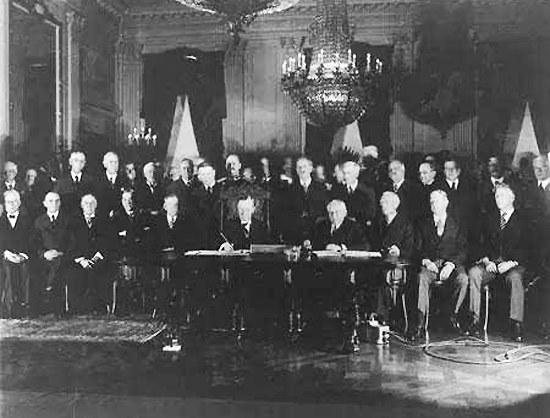Segment 27a, introduction.
27段第一部分,内容介绍
This highly exciting lecture traces the development of American foreign policy,
本次课追溯了美国从一战开始到二战结束的期间外交政策的发展
with a little domestic policy thrown in, from the beginning of World War I to the end of World War II.
也涉及了一点国内政策
Although victory in World War I promised a safer world for all involved, the reality was rather different.
尽管美国在一战中的胜利向人们许诺了一个更安全的世界,现实却并非如此
The dawn of World War II found the US still reeling from the Great Depression and none to eager for foreign entanglements.
二战开始的时候,美国才刚刚从经济大萧条中走出来,不太想卷入外国瓜葛
Especially foreign entanglements involving Germany or Japan.
尤其是涉及到德国或者日本这样的外国政治纠纷

In segment 27b "Safe for Democracy", We take up World War I,
27段第二部分,民主的安全,这一节中我们讲探讨一战
the conflict which, according to Woodrow Wilson, would make the world safe for democracy.
据伍德罗·威尔逊称,一战将会让民主更安全
The United States had done its best to stay out of the war, but German aggression ultimately forced the United States in.
美国极尽所能远离战争,但是德国的挑衅行为最终迫使美国参战
The Americans played a key role in the allied victory and they hoped to bring along a moderate peace among the line of Wilson's 14 points.
美国在同盟国的获胜中起到了关键作用,他们也希望根据威尔逊的十四点和平原则带来稳健的和平
Yet the Allies and the American Congress alike rejected Wilson's 14 points initiative, with disastrous results.
然而同盟国和美国国会都拒绝了威尔逊的十四点和平原则提议,也招致了灾难性的后果
Because of the harsh 1919 Treaty of Versailles, Germany was punished too heavily and Japan was left effectively out in the cold.
1919年的《凡尔赛条约》中,德国得到了严惩,日本受到冷落
Soviet Russia was ignored. All of this would cause later consequences.
苏维埃俄国也被忽视。这些都导致了严重的后果












